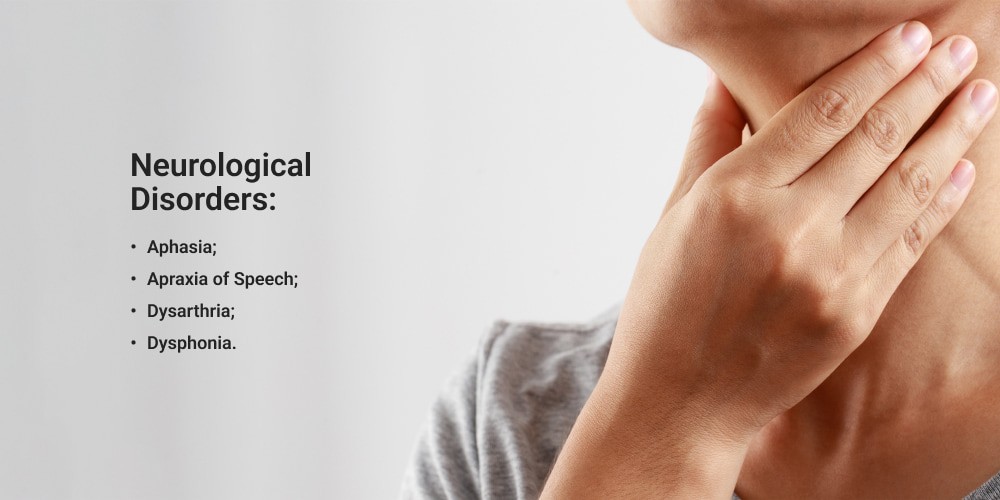Neurological disorders can have a profound impact on various aspects of human functioning. It includes speech and communication. Speech is a complex and essential form of human expression. It relies on the coordinated functioning of various regions of the brain.
But these regions can be affected by neurological disorders. Then, the ability to produce and comprehend speech can be significantly compromised. This article explores a comprehensive list of neurological disorders that specifically impact speech.
Understanding neurological disorders that affect speech is crucial. It’s essential for diagnosing and providing appropriate interventions to individuals facing communication challenges. We will shed light on these neurological disorders affecting speech. This way, we can enhance awareness and promote research. And also, it helps to develop effective strategies to support people with conditions.
Neurological Disorders Affecting Speech
Neurological disorders cover a wide range of conditions. They affect the brain and nervous system. Among the many challenges that arise, one important aspect is speech. Communicating through spoken language is crucial for daily interactions and human connection. But certain neurological disorders can disrupt this ability to speak effectively.
It’s important to understand the different neurological disorders affecting speech. This understanding helps us recognize and address challenges with care and expertise. By learning about these disorders, we can understand their unique:
- Characteristics.
- Symptoms.
- Potential treatments.
Neurological speech disorders create difficulties for those who have them. It doesn’t matter if they’re caused by:
- Strokes.
- Brain injuries.
- Neurodegenerative diseases etc.
This block explores various neurological speech disorders. We aim to raise awareness and improve our ability to support and empower individuals.
Aphasia
It is a disorder caused by damage to the brain’s lexicon centers. It typically results from stroke, brain injury, or conditions like Alzheimer’s. Individuals with verbal impairments experience challenges in expressing themselves and understanding language. Depending on the specific type of neurogenic voice disorder, symptoms may vary.
For instance, individuals with an expressive type struggle to produce words. Or they have problems forming coherent sentences. At the same time, those with receptive verbal impairments have difficulty comprehending spoken or written communication. Other types include global aphasia. It affects both expression and comprehension. And there is also anomic verbal impairment, which primarily impacts word retrieval.
Apraxia of Speech
It’s acquired motor speech disorder. It affects the ability to plan and execute the precise movements required for speech. It occurs when the brain’s communication with the muscles is disrupted. People with apraxia of speech have difficulty coordinating the movements of their:
- Lips.
- Tongue.
- Jaw.
It happens when they try to produce accurate and intelligible speech. The disorder can result from stroke, brain injury, or degenerative neurological conditions. Treatment for apraxia of speech often involves speech therapy techniques. They focus on improving motor planning and coordination.
Dysarthria
It’s acquired speech disorder. It’s characterized by weakened or impaired control over the muscles involved in speech. It can occur due to damage to the nerves or muscles responsible for speech. It often results from conditions such as:
- Parkinson’s disease.
- Multiple sclerosis.
- Traumatic brain injury.
Dysarthria affects the clarity, strength, and coordination of speech.
Signs include:
- Slurred speech.
- Slow or rapid speech.
- Difficulty controlling volume or pitch.
- Changes in voice quality.
Treatment for this neurogenic voice disorder typically involves a multidisciplinary approach. It includes speech therapy, physical therapy, and assistive communication devices.
Dysphonia
It refers to a disorder affecting the voice. It causes vocal quality, pitch, or volume changes. It arises from abnormalities in the vocal cords, respiratory system, or neurological impairment of the muscles involved in voice production. Vocal cord paralysis, vocal fold nodules, or spasmodic dysphonia can lead to dysphonia. Individuals with it may experience a hoarse, breathy, strained, or weak voice. Treatment options include:
- Voice therapy.
- Vocal exercises.
- Surgical interventions.
Neurodegenerative Disorders Affecting Speech
Neurological speech disorders are chronic and progressive conditions that affect the nervous system. They present challenges beyond just motor function. Speech is a major area affected by these disorders. The ability to communicate through speech is crucial for our:
- Identity.
- Social interactions.
Any disruption to this process has a significant impact.
Understanding the various neurological speech conditions is important for individuals and caregivers. These include Parkinson’s, Alzheimer’s, Huntington’s and other diseases. They have specific difficulties related to speech. Those difficulties can involve changes in:
- Articulation.
- Voice quality.
- Fluency.
- Language comprehension and expression.
This block explores the complexities of neurodegenerative illnesses that affect speech.
Parkinson’s Disease
It is a progressive neurological illness that mainly affects movement but also speech. People with Parkinson’s may speak softly and with a monotone voice. Their speech may become unclear, and their facial expressions less noticeable. Speech therapy can help improve their speaking volume and clarity.
Huntington’s Disease
Huntington’s Disease is an inherited condition that affects movement, thinking, and behavior. Speech difficulties often arise early on. People with it may have slurred or hard-to-understand speech. It’s due to muscle control problems. They may also struggle with finding words and understanding language. Speech therapy can teach techniques to improve speech clarity. And it can help to find alternative ways to communicate.
Amyotrophic Lateral Sclerosis (ALS)
It is also known as Lou Gehrig’s disease. It is a progressive neurogenic voice disorder that affects nerve cells controlling muscle movement. The disease can cause speaking, swallowing, and breathing problems as it advances. People with ALS may speak with slurred words, a weak or nasal voice, and struggle with breath control. Speech therapy can help them maintain their communication abilities. For this, techniques like communication devices and breathing exercises can help.
Other Neurological Disorders Affecting Speech
Neurodegenerative disorders get a lot of attention. It’s especially when it comes to speech problems. But many other disorders also affect our ability to communicate.
These disorders can be caused by:
- Brain injuries.
- Infections.
- Tumors.
- Genetics.
- Developmental issues.
They can make it hard to articulate, process language, speak fluently, modulate the voice, or a combination of these problems.
It’s important to understand these lesser-known neurogenic voice disorders. It’s because they greatly affect how people express themselves and interact with others.
In this block, we’ll explore these conditions in detail. We will discuss their unique characteristics, signs, and treatments.
Multiple Sclerosis (MS)
It is an autoimmune disease. It disrupts communication between the brain and the body. It can lead to slurred speech, difficulty articulating, and changes in voice quality. Speech therapy can help improve these issues.
Traumatic Brain Injury (TBI)
It occurs after a severe blow to the head. It can cause problems with muscle control, resulting in neurogenic voice disorders. Speech therapy is important for rehabilitation. And it can include exercises and strategies to regain speech abilities.
Stroke
A stroke happens when the blood supply to the brain is interrupted. It can cause verbal issues. They affect language comprehension and production. Different types of aphasia exist. They are difficulty speaking (expressive aphasia) or understanding (receptive aphasia). Speech therapy is crucial in stroke recovery to improve communication skills.
Brain Tumor
Brain tumors are abnormal growths in the brain. They can affect speech directly or indirectly. They may cause difficulties in articulation, word finding, comprehension, and changes in voice quality. Speech therapy provides tailored interventions to address these issues and improve communication abilities.
Bottom Line
In conclusion, there are many neurological disorders affecting speech. These disorders create various challenges for communication.
It is important to recognize and understand these disorders early on. This allows for proper intervention and the development of effective communication strategies. By increasing our knowledge and showing empathy, we can provide better support. And we will improve the quality of life for individuals with neurological disorders.
FAQs:
- What is neurogenic speech?
Neurogenic speech refers to speech abnormalities. They’re caused by damage or dysfunction in the nervous system. It’s particularly the brain and its connections to the muscles. Those are usually involved in speech production.
- What disease causes problems with speech?
Several diseases can cause problems with speech. Some common are:
- Stroke.
- Parkinson’s disease.
- Multiple sclerosis.
- ALS (Amyotrophic lateral sclerosis) etc.
- Can children develop neurogenic speech disorders?
Yes, children can develop neurogenic speech disorders. Cerebral palsy, genetic disorders, and traumatic brain injuries may cause these. These disorders in children can lead to difficulties with speech production.













Please, leave your review
1 Comment
Mervic caruna
07/04/2024
Good work ✅
Write a comment: